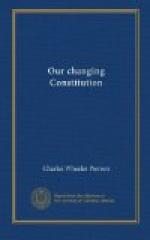[Footnote 1: 4 Wheaton, 316.]
[Footnote 2: Weston v. City of Charleston, 2 Pet., 449.]
[Footnote 3: Mercantile Bank v. New York, 121 U.S., 138, 162.]
[Footnote 4: Dobbins v. Commissioner of Erie County, 16 Pet., 435.]
[Footnote 5: Collector v. Day, 11 Wall., 113.]
[Footnote 6: Van Brocklin v. Tennessee, 117 U.S., 151.]
[Footnote 7: United States v. Railroad Co., 17 Wall., 322.]
The Supreme Court has said (and many times reiterated in substance) that the National Government “cannot exercise its power of taxation so as to destroy the state governments, or embarrass their lawful action."[1] One of the most distinguished writers on American Constitutional law (Thomas M. Cooley, Chief Justice of the Supreme Court of Michigan and afterward Chairman of the federal Interstate Commerce Commission) has said:
There is nothing in the Constitution which can be made to admit of any interference by Congress with the secure existence of any state authority within its lawful bounds. And any such interference by the indirect means of taxation is quite as much beyond the power of the national legislature as if the interference were direct and extreme.[2]
[Footnote 1: Railroad Co. v. Peniston, 18 Wall., 5, 30.]
[Footnote 2: Cooley’s Constitutional Limitations, 7th Ed., 684.]
The question as to the right of Congress to levy an income tax on municipal securities came up squarely in the famous Income Tax Cases[1] involving the constitutionality of the Income Tax Law of 1804. While the Supreme Court was sharply divided as to the constitutionality of other features of the law, it was unanimous as to the lack of authority in the United States to tax the interest on municipal bonds.
[Footnote 1: Pollock v. Farmers Loan & Trust Co., 157 U.S., 429; same case on rehearing, 158 U.S., 601.]




